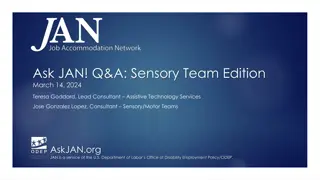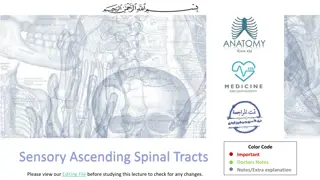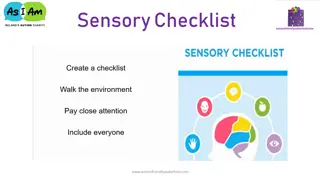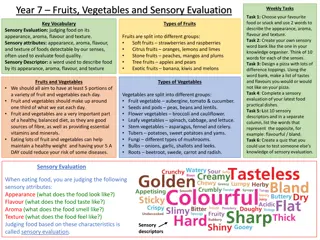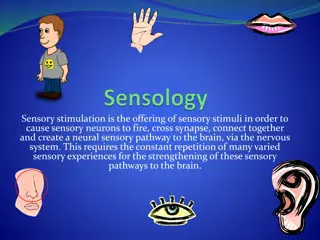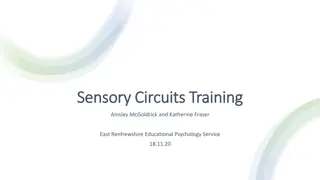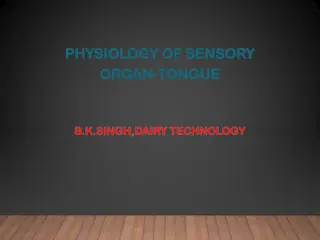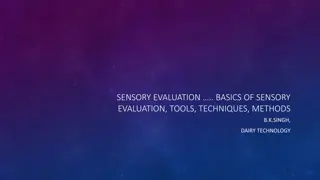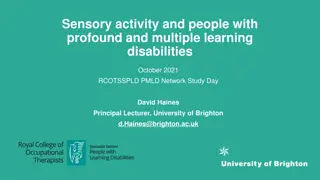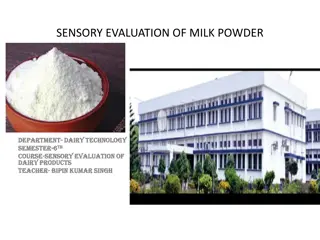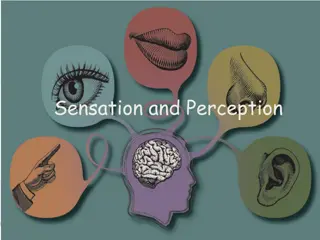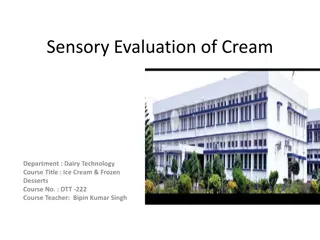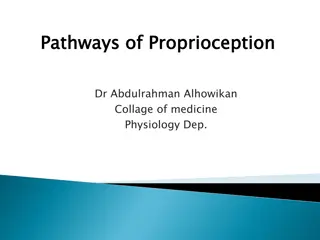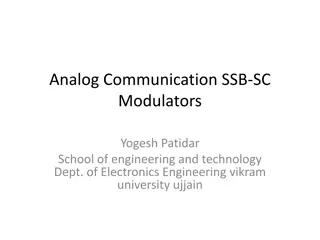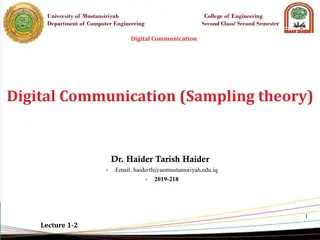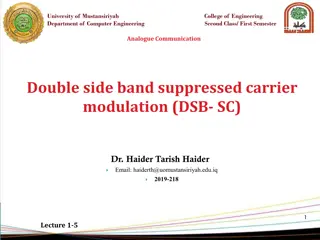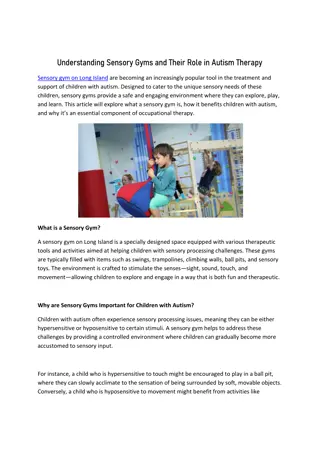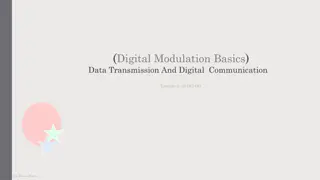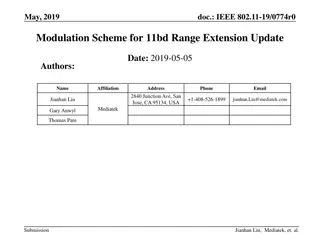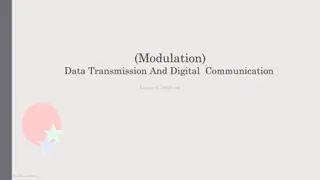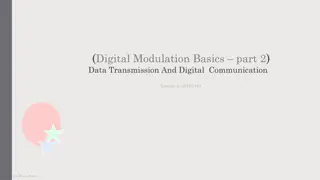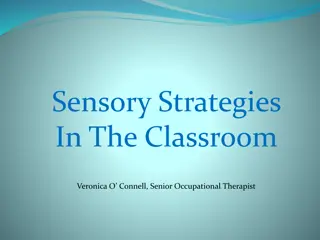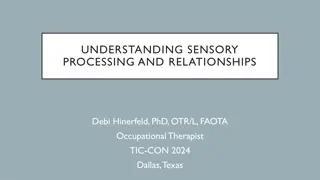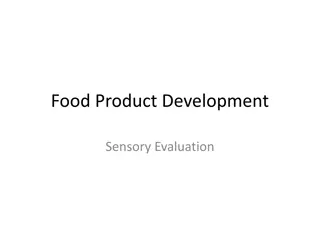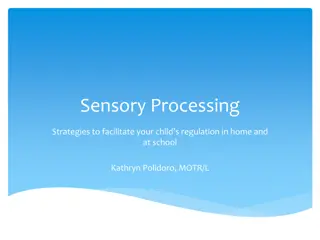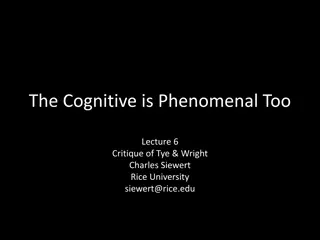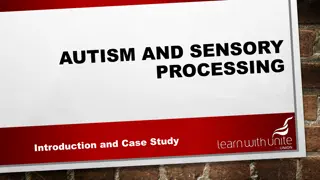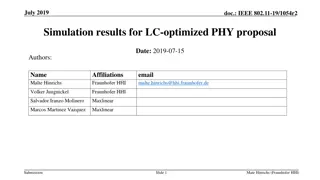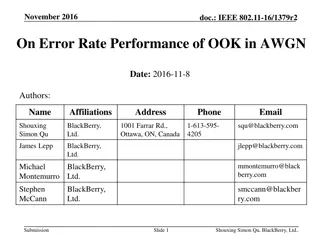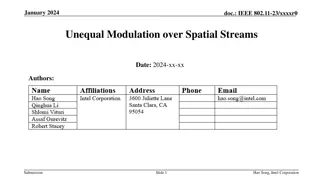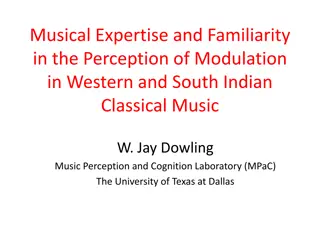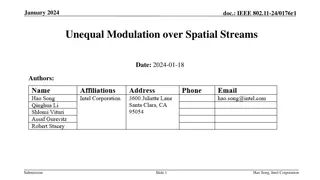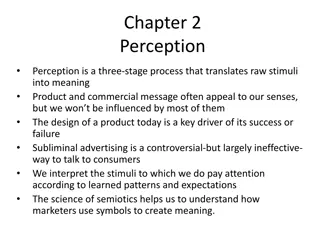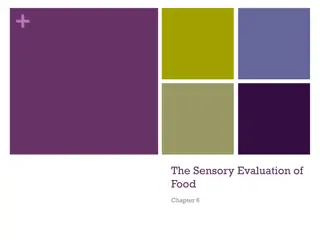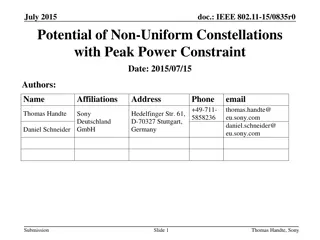Sensory Team Q&A Session Overview
Training overview for the Ask JAN Q&A: Sensory Team Edition on March 14, 2024. Learn about accommodation topics related to sensory impairments, respiratory conditions, digital accessibility, and more. Get insights from JAN consultants and engage in interactive discussions. Discover how JAN's Sensory
2 views • 30 slides
Sensory Ascending Spinal Tracts
Learn about sensory ascending spinal tracts, their classification, functions, and pathways. Explore how information is carried to the brain at conscious and subconscious levels through different types of sensations. Gain insights into the organization of white matter tracts and their importance in s
4 views • 22 slides
Enhancing Sensory Experience for Autism-Friendly Communities
Discover sensory checklists, accommodations, maps, and sensory boxes designed to create inclusive spaces for individuals with autism on autismfriendlywaterford.com. Experience a range of resources to optimize comfort and accessibility across public and employment spaces.
0 views • 5 slides
Exploring Fruits, Vegetables, and Sensory Evaluation in Food Science
Delve into the world of fruits, vegetables, and sensory evaluation through engaging tasks like describing favorite foods, creating sensory word banks, designing unique pizzas, and conducting sensory evaluations. Learn about different types of fruits and vegetables, their importance in a balanced die
0 views • 4 slides
Sensory Stimulation for Neural Pathway Development
Sensory stimulation involves offering sensory stimuli to activate sensory neurons, cross synapses, and create neural pathways to the brain. Consistent exposure to varied sensory experiences is crucial for strengthening these pathways. The provided content includes activities such as introducing lear
0 views • 9 slides
Understanding Sensory Loss in Adults: Causes, Signs, and Impact
Sensory loss, including sight and hearing impairment, can affect individuals of any age. Causes range from trauma to genetic conditions, with indicators like changes in behavior or difficulty with communication. This loss can significantly impact daily life, communication, and social interactions. R
0 views • 13 slides
Understanding Sensory Circuits Training and Integration
Explore the importance of sensory circuits training, sensory integration needs, and the impact on sensory processing. Learn about the various sensory systems, components of sensory integration, and the challenges individuals may face with sensory processing difficulties. Discover strategies to suppo
0 views • 24 slides
Understanding the Physiology of the Sensory Organ - Tongue by B.K. Singh
Taste perception on the tongue is a vital sensory function involving sweet, sour, salty, and bitter sensations. The tongue, with its muscular movements and taste buds, plays a crucial role in mastication, swallowing, and food enjoyment. Different types of papillae on the tongue are responsible for t
4 views • 33 slides
Sensory Evaluation and Grading of Milk in Dairy Technology
Judging and grading of milk in dairy technology involves sensory evaluation based on taste, smell, touch, and sound. Milk is classified into grades (Grade I, II, III) based on quality attributes such as off-flavors, colors, and foreign materials. Sensory evaluation utilizes all 5 senses to gather in
0 views • 13 slides
Understanding Sensory Evaluation in Food Science
Sensory evaluation in food science involves analyzing human responses to the characteristics of food and beverages using the senses of sight, smell, taste, touch, and hearing. This scientific discipline aims to elicit, measure, analyze, and interpret reactions to the sensory attributes of food produ
0 views • 32 slides
Understanding Sensory Activity for People with Profound Learning Disabilities
Exploring the importance of sensory activity for individuals with profound learning disabilities, this session delves into meaningful engagement through sensory experiences. Key findings from a 2018 survey are shared, highlighting the need for resource development and sharing. The focus is on sensor
0 views • 26 slides
Sensory Evaluation of Milk Powder in Dairy Technology: Flavors and Characteristics
Sensory evaluation is crucial for determining the quality and shelf life of milk powder products. This study focuses on sensory analysis methods to identify flavors and physical characteristics of whole milk powder, skim milk powder, and malted milk. It discusses common flavor defects, texture varia
2 views • 12 slides
Understanding Sensation and Perception in Psychology
Sensation and perception play crucial roles in how we experience the world around us. Sensation involves the detection of stimuli through sensory organs, while perception involves the interpretation of these stimuli in the brain. The process includes transduction, where physical energy is converted
1 views • 19 slides
Sensory Evaluation of Cream in Dairy Technology: Ice Cream & Frozen Desserts
Cream is a crucial component of dairy products, varying in fat content and processing methods. This course covers the sensory evaluation of different types of cream, including table cream, whipping cream, plastic cream, frozen cream, and more. Students learn to assess cream quality based on flavor,
0 views • 10 slides
Understanding Proprioception Pathways in Physiology
This information delves into the intricate pathways of proprioception, focusing on the somatotopic organization of ascending sensory pathways, types of receptors involved, dorsal column tracts like gracilus and cuneatus, spinocerebellar tracts, and the role of the cerebral cortex in perceiving propr
0 views • 22 slides
Understanding Sensation and Perception in Psychology
Sensation and perception play crucial roles in how we interpret the world around us. Sensation is the process by which stimuli trigger our sensory receptors, while perception involves organizing and interpreting sensory information. This chapter delves into thresholds, sensory differences, Weber's L
0 views • 52 slides
Understanding Performance Analysis of Digital Modulation Techniques
Explore the realm of digital modulation techniques such as ASK, FSK, PSK, QPSK, QAM, and more. Learn about bandwidth efficiency, baud rates, minimum bandwidth, and how to calculate them. Discover the importance of M-ary modulation and how it impacts data transmission rates and bandwidth requirements
4 views • 18 slides
Understanding SSB-SC Modulation in Analog Communication
Single Sideband Suppressed Carrier (SSB-SC) modulation is a technique in analog communication that transmits a single sideband along with the carrier signal, offering advantages such as reduced bandwidth consumption, increased signal transmission capacity, and lower noise interference. However, the
0 views • 9 slides
Understanding Digital Communication and Sampling Theory in Computer Engineering
Digital communication in the context of computer engineering involves representing information in binary form for transmission. Sampling theory plays a key role in pulse modulation techniques, noise management, and modulation schemes like ASK, PSK, FSK, and QPSK. This course covers various topics su
7 views • 14 slides
Analogue Communication: DSB-SC Modulation in Computer Engineering
Explore the world of Analogue Communication through Double Sideband Suppressed Carrier Modulation (DSB-SC) in the Computer Engineering Department at the University of Mustansiriyah. Delve into lectures covering the fundamentals and intricacies of this modulation technique under the guidance of Dr. H
1 views • 17 slides
Understanding Sensory Gym on Long Island and Their Role in Autism Therapy
Sensory gym on Long Island are becoming an increasingly popular tool in the treatment and support of children with autism. Designed to cater to the unique sensory needs of these children, sensory gyms provide a safe and engaging environment where the
4 views • 3 slides
Understanding Digital Modulation in Data Transmission
Delve into the world of digital modulation for data transmission, exploring various modulation schemes, digital-to-analog conversion processes, the importance of digital modulation in mixed networks, and the fundamentals of modulation and demodulation.
0 views • 27 slides
Modulation Schemes for IEEE 802.11bd Range Extension
The document discusses modulation schemes for extending the range in IEEE 802.11bd, aiming for at least 3dB lower sensitivity levels. It highlights the need for an implementation-friendly, proven technology already adopted in IEEE 802.11. The introduction of the MCS0 DCM scheme in 11ax is also cover
0 views • 15 slides
Understanding Modulation in Data Transmission and Digital Communication
Modulation plays a crucial role in data transmission and digital communication by altering the characteristics of a carrier signal based on the message signal. This lecture discusses analog and digital modulation techniques such as AM, FM, PM, and their operations. It covers the basics of amplitude
0 views • 33 slides
Introduction to Quadrature Amplitude Modulation (QAM) in Digital Communication
Quadrature Amplitude Modulation (QAM) is a widely used modulation technique for transmitting data signals onto a carrier in communication systems. It offers advantages like increased efficiency by combining amplitude and phase variations, making it suitable for various radio and data delivery applic
0 views • 15 slides
Effective Strategies for Children with Developmental Language Disorder, Sensory Processing Disorder, and Fine Motor Delays
Children with Developmental Language Disorder (DLD), Sensory Processing Disorder (SPD), and Fine Motor Delays often have accompanying sensory and fine motor deficits. Research indicates that addressing sensory processing deficits can significantly benefit children with DLD, ADHD, autism, and other d
0 views • 61 slides
Understanding Sensory Strategies in the Classroom
Explore sensory modulation and its impact on everyday activities. Gain knowledge of sensory systems, levels of alertness, and practical strategies for regulating sensory input in educational settings. Discover the hidden senses, cognitive strategies, and techniques to maintain the Just Right State f
0 views • 37 slides
Understanding Sensory Processing and Relationships: Exploring Individual Differences
Explore the intricate connections between sensory processing and behavioral responses, delving into how individual variations in sensory patterns can impact relationships, engagement, and daily routines. Gain insights into the significance of sensory experiences in nurturing brain function, and lear
0 views • 29 slides
Understanding Sensory Evaluation in Food Product Development
Sensory evaluation in food product development involves measuring, analyzing, and interpreting how food characteristics are perceived by the senses. This process helps in understanding organoleptic properties, conducting different types of sensory tests such as discrimination and descriptive tests,
0 views • 35 slides
Understanding Sensory Processing in Children: Strategies for Home and School
Sensory processing plays a crucial role in how individuals respond to stimuli. When not developed properly, it can lead to various challenges affecting learning, behavior, and social engagement. This article explores sensory processing strategies to help children regulate their responses at home and
0 views • 19 slides
Exploring Phenomenal Consciousness: Reducibility, Variation, and Cognitive Phenomenology
Delve into the rich realm of phenomenal consciousness, dissecting the interplay between sensory and conceptual elements. Contemplate the essence of cognitive activity, sensory features, and the potential inclusion of non-sensory aspects within consciousness. As you ponder reducibility, variation, an
0 views • 28 slides
Understanding Sensory Overload: A Day in the Life of Logan with Sensory Processing Disorder
Explore Logan's daily experiences as a 9-year-old boy with sensory processing disorder, delving into how various sensory stimuli impact his routines. From waking up to challenges with food textures, this case study sheds light on the complexities of sensory overload in individuals like Logan.
0 views • 36 slides
Simulation Results for LC-Optimized PHY Proposal in July 2019
The document presents simulation results for an LC-optimized PHY proposal for TGbb based on G.9991 PHY. It includes details on the simulation setup, frame detection results, header modulation, coding simulation results, payload modulation, and coding simulation results. The setup involved various re
0 views • 18 slides
Error Rate Performance of OOK Modulation in AWGN Channels
This document discusses the error rate performance of On-off keying (OOK) modulation in Additive White Gaussian Noise (AWGN) channels, covering both coherent and non-coherent detection methods. The theoretical results and evaluations of OOK modulation in AWGN are reviewed, providing insights into op
0 views • 17 slides
Comparison of Unequal Modulation and Unequal MCS in IEEE 802.11-23
The comparison between Unequal Modulation and Unequal MCS in the context of IEEE 802.11-23 discusses how these techniques handle spatial streams, modulation schemes, and coding rates to optimize throughput and MIMO gains. Unequal Modulation focuses on adjusting modulations per stream based on SNR co
0 views • 10 slides
Understanding Modulation and Tonal Hierarchies in Music Perception
This research explores how expertise influences the perception of modulation in Western and South Indian classical music, focusing on tonal hierarchies, pitch importance, modulation processes, and memory for melodies. Through experiments involving listeners rating probe tones against music excerpts,
1 views • 26 slides
Maximizing Throughput in IEEE 802.11 Networks Through Unequal Modulation Strategies
The documents discuss the benefits of using unequal modulation over spatial streams in IEEE 802.11 networks to enhance throughput. Unequal modulation allows for adapting modulation schemes based on Signal-to-Noise Ratio (SNR) conditions, optimizing MIMO gains and coding rates for each spatial stream
0 views • 10 slides
Understanding the Three-Stage Process of Perception
Perception is a complex three-stage process that involves translating raw stimuli into meaning. This process includes sensation, where sensory receptors respond to stimuli, and perception, where sensations are organized and interpreted. Marketers leverage sensory cues such as colors, sounds, and odo
0 views • 8 slides
Understanding Sensory Evaluation: Influences on Food Choices and Evaluation Techniques
Explore the sensory evaluation of food in Chapter 6, focusing on factors influencing food choices such as culture, emotions, and health concerns. Learn about sensory characteristics affecting preferences, taste perception, and the scientific approach to evaluating food through sight, smell, taste, t
0 views • 11 slides
Potential of Non-Uniform Constellations for Peak Power Constraint in SC Modulation
This document discusses the potential of non-uniform constellations (NUCs) for single carrier (SC) modulation, focusing on the design of NUCs with 64 signal points to maximize coding gain while adhering to peak-to-average power ratio (PAPR) constraints. NUCs show a significant overall gain of up to
0 views • 19 slides
